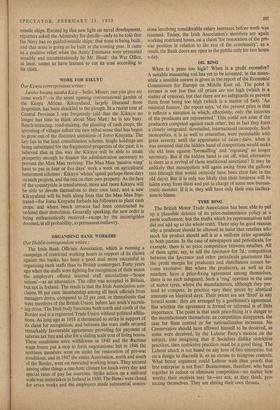TYRE RING
The British Motor Trade Association has been able to put up a plausible defence of its price-maintenance policy at a press conference; but the truths which its representatives told did not add up to the whole truth. There may be good reasons why a producer should be allowed to insist that retailers who stock his product should sell it at a uniform price agreeable to both parties. In the case of newspapers and periodicals, for example, there is no price competition between retailers. All of them agree, say, to sell the Spectator for 7d.; competition between' the Spectator and other periodicals guarantees that the profit margin for producers and distributors cannot be- come excessive. But where the producers, as well as the retailers, have a price-fixing agreement among themselves, there is no such safeguard. Such a 'ring' operates in the case of motor tyres. where the manufacturers, although they pre- tend to compete, in practice vary their prices by identical amounts on identical days. Their prices are not 'fixed' in any formal sense: they are arranged by a gentleman's agreement. But whether the agreement is formal or informal is of little importance. The point is that such price-fixing is a danger to the manufacturers themselves; as competition disappears, the case for State control or for nationalisation increases. No Conservative should have allowed himself to be deceived, as some were deceived, by the Labour Party's motion on the subject, into imagining that if Socialists dislike restrictive practices, then restrictive practices must be a good thing. The Labour attack is not based on any love of free enterprise, but on a design to discredit it, as an excuse to reimpose controls. What better argument could Labour wish than proofs that free enterprise is not free? 'Businessmen, therefore, who band together to reduce or eliminate competition—no matter how worthy their motives may be—are not, as they think. pro-










































 Previous page
Previous page